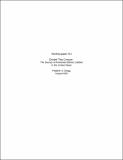Divided They Conquer: The Success of Armenian Ethnic Lobbies in the United States
Author(s)
Gregg, Heather S.
Download13_divided.pdf (121.9Kb)
Metadata
Show full item recordAbstract
The end of the Cold War has sparked considerable academic and policy debates on the direction and aims of US foreign policy. One aspect of that debate has centered on the role of ethnic groups in influencing foreign policy and determining the national interest. Two broad camps are visible in this debate. The first camp argues that ethnic lobbies are highly influential and a threat to US foreign policy and the national interest (Schlesinger, Jr.: 1992; Huntington: 1997; Smith: 2000). The second camp sees these groups as moderately influential but largely beneficial; specifically, they promote American interests abroad (Clough: 1992; Shain: 1999). Neither of these camps, despite their conclusions, has offered rigorous case studies aimed at measuring the impact of ethnic lobby groups on the US foreign policy process nor divulging how these groups attain their alleged influence.
One US minority in particular, Armenian-Americans, has achieved considerable success in gaining political and material support from Congress. Such achievements include roughly $90 million in annual aid for the state of Armenia; maintenance of Section 907 of the Freedom of Support Act, which blocks aid to Armenia’s rival Azerbaijan; the stalling of an arms deal with Turkey; and increased support for official US governmental recognition of the Armenian genocide of 1915-1921.
This case study of Armenian lobby groups in the US argues that the amount of aid and support for Armenia and Armenian issues is best explained by the intense lobbying efforts of Armenian-Americans in the United States. The lobbying success of this small US minority is largely the result of two factors: an intense inter-community rivalry between two factions within the Armenian-American population, which has led to hypermobilization of this ethnic group’s resources, and the formation of key alliances in Washington including members of Congress and other lobby groups and organizations.
Date issued
2002-08Publisher
Inter-University Committee on International Migration
Series/Report no.
Rosemarie Rogers Working Paper Series;13